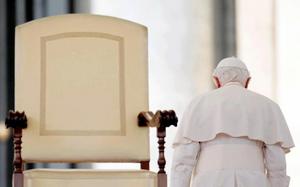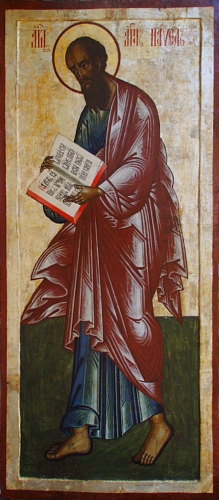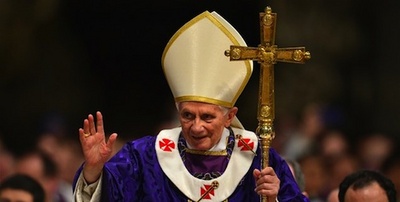Pope Benedict XVI: February 2013 Archives
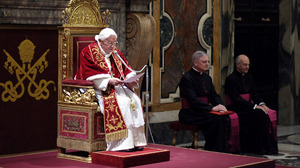
I welcome you all with great joy and cordially greet each one of you. I thank Cardinal Angelo Sodano, who as always, has been able to convey the sentiments of the College, Cor ad cor loquitur. Thank you, Your Eminence, from my heart.
And referring to the disciples of Emmaus, I would like to say to you all that it has also been a joy for me to walk with you over the years in light of the presence of the Risen Lord. As I said yesterday, in front of thousands of people who filled St. Peter's Square, your closeness, your advice, have been a great help to me in my ministry. In these 8 years we have experienced in faith beautiful moments of radiant light in the Churches' journey along with times when clouds have darkened the sky. We have tried to serve Christ and his Church with deep and total love which is the soul of our ministry. We have gifted hope that comes from Christ alone, and which alone can illuminate our path. Together we can thank the Lord who has helped us grow in communion, to pray to together, to help you to continue to grow in this deep unity so that the College of Cardinals is like an orchestra, where diversity, an expression of the universal Church, always contributes to a superior harmony of concord. I would like to leave you with a simple thought that is close to my heart, a thought on the Church, Her mystery, which is for all of us, we can say, the reason and the passion of our lives. I am helped by an expression of Romano Guardini's, written in the year in which the Fathers of the Second Vatican Council approved the Constitution Lumen Gentium, his last with a personal dedication to me, so the words of this book are particularly dear to me .
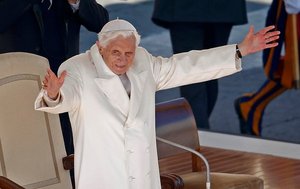
I offer a warm and affectionate greeting to the English-speaking pilgrims and visitors who have joined me for this, my last General Audience. Like Saint Paul, whose words we heard earlier, my heart is filled with thanksgiving to God who ever watches over his Church and her growth in faith and love, and I embrace all of you with joy and gratitude. During this Year of Faith, we have been called to renew our joyful trust in the Lord's presence in our lives and in the life of the Church. I am personally grateful for his unfailing love and guidance in the eight years since I accepted his call to serve as the Successor of Peter. I am also deeply grateful for the understanding, support and prayers of so many of you, not only here in Rome, but also throughout the world. The decision I have made, after much prayer, is the fruit of a serene trust in God's will and a deep love of Christ's Church. I will continue to accompany the Church with my prayers, and I ask each of you to pray for me and for the new Pope. In union with Mary and all the saints, let us entrust ourselves in faith and hope to God, who continues to watch over our lives and to guide the journey of the Church and our world along the paths of history. I commend all of you, with great affection, to his loving care, asking him to strengthen you in the hope which opens our hearts to the fullness of life that he alone can give. To you and your families, I impart my blessing. Thank you!
Thank you for coming in such large numbers to this last General Audience of my pontificate.
Like the Apostle Paul in the biblical text that we have heard, I feel in my heart the paramount duty to thank God, who guides the Church and makes her grow: who sows His Word and thus nourishes the faith in His people. At this moment my spirit reaches out to embrace the whole Church throughout the world, and I thank God for the "news" that in these years of Petrine ministry I have been able to receive regarding the faith in the Lord Jesus Christ, and the charity that circulates in the body of the Church - charity that makes the Church to live in love - and of the hope that opens for us the way towards the fullness of life, and directs us towards the heavenly homeland.
I feel I [ought to] carry everyone in prayer, in a present that is God's, where I recall every meeting, every voyage, every pastoral visit. I gather everyone and every thing in prayerful recollection, in order to entrust them to the Lord: in order that we might have full knowledge of His will, with every wisdom and spiritual understanding, and in order that we might comport ourselves in a manner that is worthy of Him, of His, bearing fruit in every good work (cf. Col 1:9-10).
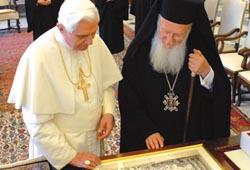
The Patriarch of Constantinople, Bartholomew I, wrote a letter on occasion of the abdication of Pope Benedict. It is a warm letter and testimony to his co-worker in the vineyard. In an era of lots of change in the leadership of many changes, it is interesting to what is said,
It is with regret that we have learned of the decision by His Holiness Pope Benedict to retire from his Throne, because with his wisdom and experience he could have provided much more to the Church and the world.
Pope Benedict leaves an indelible mark on the life and history of the Roman Catholic Church, sealed not only by his brief papacy, but also by his broad and longstanding contribution as a theologian and hierarch of his Church, as well as his universally acknowledged prestige.
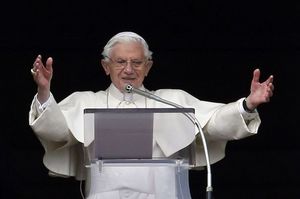
This is Pope Benedict's final Angelus address as the Supreme Pontiff of the one, holy, catholic and apostolic Church. Notice the imagery he uses: the climbing the mountain and "once you've met Christ, why come down to pain?" The Pope has a new vocation: to live in adoration of Christ.
On the second Sunday of Lent, the liturgy always presents us with the Gospel of the Transfiguration of the Lord. The evangelist Luke places particular emphasis on the fact that Jesus was transfigured as he prayed: his is a profound experience of relationship with the Father during a sort of spiritual retreat that Jesus lives on a high mountain in the company of Peter, James and John , the three disciples always present in moments of divine manifestation of the Master (Luke 5:10, 8.51, 9.28).
The Lord, who shortly before had foretold his death and resurrection (9:22), offers his disciples a foretaste of his glory. And even in the Transfiguration, as in baptism, we hear the voice of the Heavenly Father, "This is my Son, the Chosen One listen to him" (9:35). The presence of Moses and Elijah, representing the Law and the Prophets of the Old Covenant, it is highly significant: the whole history of the Alliance is focused on Him, the Christ, who accomplishes a new "exodus" (9:31) , not to the promised land as in the time of Moses, but to Heaven. Peter's words: "Master, it is good that we are here" (9.33) represents the impossible attempt to stop this mystical experience. St. Augustine says: "[Peter] ... on the mountain ... had Christ as the food of the soul. Why should he come down to return to the labors and pains, while up there he was full of feelings of holy love for God that inspired in him a holy conduct? "(Sermon 78.3).
With the Church we pray
Grant, we pray, almighty God, that no tempests may disturb us, for you have set us fast on the rock of the Apostle Peter's confession of faith.
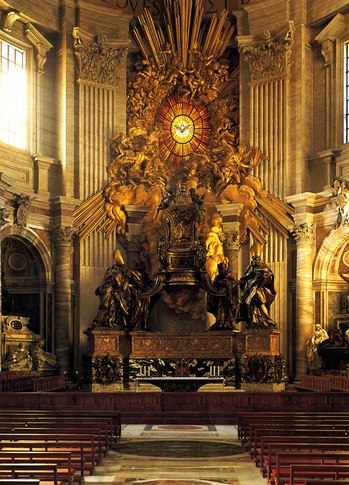
Has anyone promised you anything? As Catholics, we can say with certainty that we have been promised something. In fact, we are promised not only something, but Someone. We can identify that we have been promised the truth, happiness (in this life) and eternal life (happiness in the next life); we've also been promised a rich relationship with God, with Jesus, and the Holy Spirit. Today's feast of the Chair of Saint Peter is the Church's way of reminding God and each other that we have been promised all these things: truth, happiness, and life eternal with God.
For a very, very long time, actually since the 4th century, the Church of Rome has had a special commemoration of the pastoral, spiritual authority of Saint Peter as the rock upon which the Lord built His Church. Historians estimate that Saint Peter was executed between the years 64 and 68. In fact, the Church in Antioch, founded by Saint Peter, has also had this feast on their liturgical calendar. The witnesses found in the Apostolic Fathers, the Roman See has always held a special place in the obedience of orthodox Christian believers because of the bishop of Rome "presides in love" and in service over all the Churches of God.
Today's feast ought to remind each one of us that we don't celebrate furniture but it calls us to see in Peter Jesus. Each feast of a saint, including the Blessed Mother, always points to Jesus. To do otherwise would be idolatry. The Chair of Saint Peter is fundamentally about work, the mission of bishop as overseer, teacher and pastor conferred by Jesus on Peter, and continued through the ages to Pope Benedict XVI (and soon on his successor). See the Gospel of Matthew 16:13-20. What we celebrate today is the communion of faith, the truth of the faith given to us by the Lord through the apostles to the bishop of Rome and to all bishops. You may even say the feast we celebrate today is the ministry of the Church's Magisterium located in the Roman Pontiff in that he cannot teach error. That does not mean the pope is a saint; that the pope does not sin; on contrary, we believe the pope is a sinner and in need of redemption like each one of us: he has clay feet like you and me. But having clay feet doesn't mean that teach that we believe in "Christ, the Son of the Living God." His job is to help us see the face of Christ in this world, and to lead us to Him so that may enjoy eternity with Him.
In 2006, Benedict XVI gave the following address on this feast which is required reading,
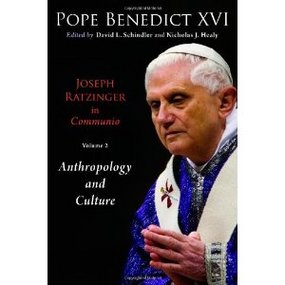
Book sales will no doubt sky rocket with Benedict's resignation next week. But this superficial reason won't hold those really interested in one of THE most pivotal thinkers of the Church in the 20th and 21st centuries when Volume 2, Joseph Ratzinger in Communio: Anthropology and Culture (Michigan/Cambridge, Wm. B. Eerdmans Publishing Co., 2013) is in the mailbox.
Joseph Ratzinger in Communio: Anthropology and Culture is edited by David L. Schindler and Nicholas J. Healy. The 14 texts herein address anthropological themes written by Joseph Ratzinger between 1972 and 2005. That Eerdmans is the publisher is a terrific help since their list is widely acclaimed and ecumenical.
Indeed, "It would be foolish to act as if nothing happened" with the abdication of a pope, and much more since it was Benedict XVI. While I am not completely surprised by his gesture of love for the Church, I am saddened that he's exiting stage left because I have come to rely on him as a credible witness of how to live my Christian life with vigor.
Editorials are flying around faster than the wicked witch: some are very worth reading and some not. One would swear that the commentators have never read a word that Razinger wrote or truly observed a gesture of Benedict XVI. But won't realize this until you digest what's said.
Let me offer an editorial from La Repubblica (February 15, 2013) written by Father Julián Carrón, President of the Fraternity of Communion and Liberation. "Ratzinger's Cross" gives reasons of true Hope.
An excerpt...
What was capable of filling the entire world with silence, all of a sudden?
That astonished moment destroyed, in one stroke, the images that we normally have of Christianity: a past event, an earthly organization, a group of roles, a morality about things that we should or shouldn't do... No, all of this cannot give adequate reasons for what happened on February 11th. We must look elsewhere for the explanation.
Therefore, faced with the Pope's gesture, I wondered: Will anyone ask themselves who Christ is for Joseph Ratzinger, if the bond with Him led him to carry out an act of freedom this surprising, which everyone--believers or not--recognized as exceptional and profoundly human? Avoiding this question would leave the event without an explanation and, what is worse, we would miss the most precious part of what it witnesses to us. It cries out, in fact, just how real the person of Christ is in the life of the Pope, how much Christ must be contemporaneous and powerfully present in order for him to generate a gesture of freedom from everything and everyone, an unheard-of novelty, so impossible for man. Full of wonder, I was then forced to shift my gaze to what made it possible: Who are You, who fascinate a man to the point of making him so free that he provokes the desire for the same freedom in us, too? "Christ in His beauty draws me to Him," exclaimed another man passionate about Christ, Jacopone da Todi. I haven't found a better explanation.
Full text: Julián Carrón Ratzinger's Cross.pdf
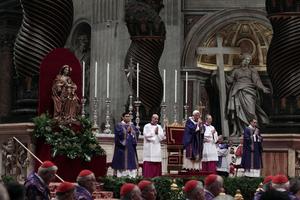
Today, Ash Wednesday, we begin a new Lenten journey, a journey that extends over forty days and leads us towards the joy of Easter, to victory of Life over death. Following the ancient Roman tradition of Lenten stations, we are gathered for the celebration of the Holy Eucharist. The tradition says that the first statio took place in the Basilica of Saint Sabina on the Aventine Hill. Circumstances suggested we gather in Saint Peter's Basilica. Tonight there are many of us gathered around the tomb of the Apostle Peter, to also ask him to pray for the path of the Church going forward at this particular moment in time, to renew our faith in the Supreme Pastor, Christ the Lord. For me it is also a good opportunity to thank everyone, especially the faithful of the Diocese of Rome, as I prepare to conclude the Petrine ministry, and I ask you for a special remembrance in your prayer.
When the Pope came into the Paul VI Hall he was greeted with lots of people which is typical, but there seemed to be more than c. 8000 people in attendance. The outpouring of affection was evident. Before the weekly teaching, he said,
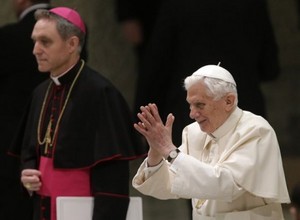
Dear brothers and sisters, as you know I decided. Thank you for your kindness. I decided to resign from the ministry that the Lord had entrusted me on April 19, 2005. I did this in full freedom for the good of the Church after having prayed at length and examined my conscience before God, well aware of the gravity of this act.
I was also well aware that I was no longer able to fulfill the Petrine Ministry with that strength that it demands. What sustains and illuminates me is the certainty that the Church belongs to Christ whose care and guidance will never be lacking. I thank you all for the love and prayer with which you have accompanied me.
I have felt, almost physically, your prayers in these days which are not easy for me, the strength which the love of the Church and your prayers brings to me. Continue to pray for me and for the future Pope, the Lord will guide us!
The catechesis the Pope offers us today...
In his book-length interview with Peter Seewald, Light of the World, Pope Benedict responded to Seewald's question as to whether a pope should resign saying, "Yes. If a Pope clearly realizes that he is no longer physically, psychologically, and spiritually capable of handling the duties of his office, then he has a right and, under some circumstances, also an obligation to resign."
And, now Benedict has done it.
Following Benedict XVI's announcement of his renunciation of the Petrine ministry, Father Julián Carrón, President of the Fraternity of Communion and Liberation, issued this statement:
With this gesture, as imposing as it is unexpected, the Pope witnesses to us such a fullness in the relationship with Christ that he surprises us with an unprecedented act of freedom that puts the good of the Church before all else. Thus he shows everyone that he is completely entrusted to the mysterious design of an Other.
Who would not want a freedom like this?
The Pope's gesture is a powerful reminder to renounce every human security, trusting exclusively in the strength of the Holy Spirit. It's as if Benedict XVI said to us, in St. Paul's words, 'I am confident of this, that the one who began a good work in you will continue to complete it until the day of Christ Jesus' (Phil 1:6).
Through the Pope's announcement, the Lord asks us to pierce through all appearances, going back through all of the human enthusiasm with which we greeted Benedict XVI's election and with which we have followed him in these eight years, grateful for every word of his.
We, too, desire to live the same experience of identification with Christ that dictated this historic act for the life of the Church and of the world to the Pope; and so, it is with freedom and full of wonder that we receive this extreme gesture of paternity, carried out for love of his children, entrusting his person to Our Lady so that he may continue to be our father, giving his life for the work of an Other, that is, for the edification of God's Church.
With all of our brothers and sisters, together with Benedict XVI, we ask the Spirit of Christ to assist the Church in the choice of a father who can guide her in a historic moment that is so delicate and decisive.
CL Press Office
Milan, February 11, 2013
The pressman for the Pope gives the timeline as we know it:
- Pope Benedict XVI has given his resignation freely, in accordance with Canon 332 §2 of the Code of Canon Law. [PAZ: "If it happens that the Roman Pontiff resigns his office, it is required for validity that the resignation is made freely and properly manifested but not that it is accepted by anyone."]
- Pope Benedict XVI will not take part in the Conclave for the election of his successor.
- Pope Benedict XVI will move to the Papal residence in Castel Gandolfo when his resignation shall become effective.
- When renovation work on the monastery of cloistered nuns inside the Vatican is complete, the Holy Father will move there for a period of prayer and reflection.
Pope Benedict XVI will be the 7th pope to have resigned his office.
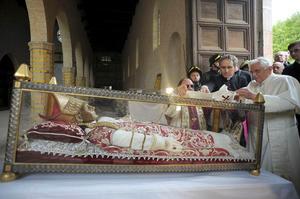
The picture shows Pope Benedict XVI placing a pallium on the casket of 13th-century Pope Saint Celestine V.
Saint Celestine V was one of the few popes who resigned or abdicated (contrary to the claim by many writers that he was the only pope to do so) in 1294.
The other popes who did so were:
- Pontian in 235
- Silverius in 537
- Martin I in 653
- John XVIII retired to a monastery in 1009
- Benedict IX abdicated in 1045 but was restored to office in 1047
- Gregory XII resigned in 1415 in an effort to end the Great Schism that split the Church from 1378 to 1417; appointed Bishop of Porto by the Council meeting in Constance.
Pope Benedict was elected on 19 April 2005: 7 years, 10 months, 10 days.
Among the popes, Benedict has served a good time, some say. In comparison:
Pope Urban VII: 13 days (1590)
Pope John Paul II: 26 years, 4 months (1978-2005)
Pope Pius IX: 31 years, 7 months, 23 days (1846-1878)
There is no one to accept Pope Benedict's resignation but God. We ought to recognize in the Benedict's intention to resign the petrine Office a profound act of humility and integrity; one can say without certainty that this is a man takes his vocation seriously so as to take such an unusual step for the good of the Church.
This morning Pope Benedict XVI announced his intention to resign the petrine office. His note of intention is dated on the feast of Saint Scholastica, the twin sister of Saint Benedict. The resignation become effective on 28 February at 8pm. He will finish paperwork and quietly retire.
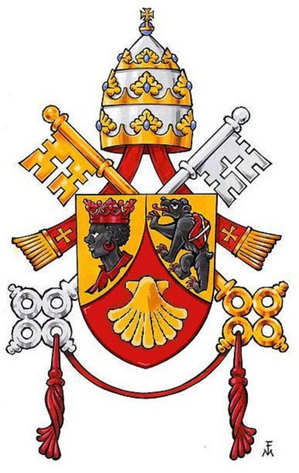 I have convoked you to this Consistory, not only for the three canonizations, but also to communicate to you a decision of great importance for the life of the Church. After having repeatedly examined my conscience before God, I have come to the certainty that my strengths, due to an advanced age, are no longer suited to an adequate exercise of the Petrine ministry. I am well aware that this ministry, due to its essential spiritual nature, must be carried out not only with words and deeds, but no less with prayer and suffering. However, in today's world, subject to so many rapid changes and shaken by questions of deep relevance for the life of faith, in order to govern the bark of Saint Peter and proclaim the Gospel, both strength of mind and body are necessary, strength which in the last few months, has deteriorated in me to the extent that I have had to recognize my incapacity to adequately fulfill the ministry entrusted to me. For this reason, and well aware of the seriousness of this act, with full freedom I declare that I renounce the ministry of Bishop of Rome, Successor of Saint Peter, entrusted to me by the Cardinals on 19 April 2005, in such a way, that as from 28 February 2013, at 20:00 hours, the See of Rome, the See of Saint Peter, will be vacant and a Conclave to elect the new Supreme Pontiff will have to be convoked by those whose competence it is.
I have convoked you to this Consistory, not only for the three canonizations, but also to communicate to you a decision of great importance for the life of the Church. After having repeatedly examined my conscience before God, I have come to the certainty that my strengths, due to an advanced age, are no longer suited to an adequate exercise of the Petrine ministry. I am well aware that this ministry, due to its essential spiritual nature, must be carried out not only with words and deeds, but no less with prayer and suffering. However, in today's world, subject to so many rapid changes and shaken by questions of deep relevance for the life of faith, in order to govern the bark of Saint Peter and proclaim the Gospel, both strength of mind and body are necessary, strength which in the last few months, has deteriorated in me to the extent that I have had to recognize my incapacity to adequately fulfill the ministry entrusted to me. For this reason, and well aware of the seriousness of this act, with full freedom I declare that I renounce the ministry of Bishop of Rome, Successor of Saint Peter, entrusted to me by the Cardinals on 19 April 2005, in such a way, that as from 28 February 2013, at 20:00 hours, the See of Rome, the See of Saint Peter, will be vacant and a Conclave to elect the new Supreme Pontiff will have to be convoked by those whose competence it is.Dear Brothers, I thank you most sincerely for all the love and work with which you have supported me in my ministry and I ask pardon for all my defects. And now, let us entrust the Holy Church to the care of Our Supreme Pastor, Our Lord Jesus Christ, and implore his holy Mother Mary, so that she may assist the Cardinal Fathers with her maternal solicitude, in electing a new Supreme Pontiff. With regard to myself, I wish to also devotedly serve the Holy Church of God in the future through a life dedicated to prayer.
From the Vatican, 10 February 2013
BENEDICTUS PP XVI
